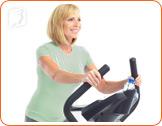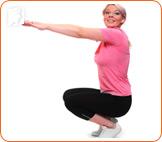
Throughout menopause, nearly 70% of women experience irregular periods. Irregular periods are typically triggered through fluctuating hormonal levels, which usually means a decrease in estrogen production and a trigger for other menopausal symptoms. There are solutions that can decrease symptoms of irregularity such as physical activity. Besides the external benefits, exercise helps internally your body's hormonal systems, which can curb irregular periods. Read on to learn about the benefits of lifestyle changes to help treat irregular periods.
Lifestyle Changes
Decreasing stress and following a healthy eating regime are vital in reducing the occurrence of irregular periods. Practicing stress techniques like acupuncture, yoga, and meditation can also be very beneficial.
There are two approaches that are useful to treating irregular periods.
Diet

Adding a healthy diet rich in complex carbohydrates, fruit, salad, fish, and poultry can help reduce testosterone levels while consuming fried, oily, and sugary foods will increase testosterone levels and lead to weight gain. Fluctuations in weight can also lead to irregular periods. Aim for a healthy weight to help improve your overall quality of health.
Exercise

Depending on your type of menstrual irregularity, exercise can be very helpful. Women who exercise regularly report having decreased symptoms, less cramping, shorter periods, and less bleeding. Many women also find relief from severe cramps through regular exercise. For some women exercise during menstruation can seem unthinkable due to the severity of their cramps. For these women, exercising regularly at other times throughout the month can be a more helpful approach. Regular exercise is known to strengthen the pelvic muscles, which give greater support to the reproductive organs.
Exercise also causes the body to release beta-endorphins which act as an opioid. These can help relieve the symptoms of PMS and cramping.

Caution — too much exercise can lead to additional problems. Female athletes that exercise intensely or have less than 22% body fat often stop menstruating completely.
Exercising for at least five days a week for 30 minutes will certainly help to reap the benefits of exercise. If possible choose an aerobic exercise such as walking, dancing, or playing sports.
Recommendation
Every woman's menstrual cycle is different. It is important to keep track of your irregularity by keeping a record. Use a calendar to record the number of days your period lasts to allow you keep tabs on how regular or irregular your period occurs. Click here to read more about treatments for irregular periods.
Sources
- BMJ Group. "Menopause: What Is It?" Patient Leaflet, 2007.
- Hutchinson, Susan, M.D. "The Stages of a Woman's Life: Menstruation, Pregnancy, Nursing, Perimenopause, Menopause." November 2007.
- Love, Susan, M.D. Menopause and Hormone Book. New York: Three Rivers Press, 2003.



